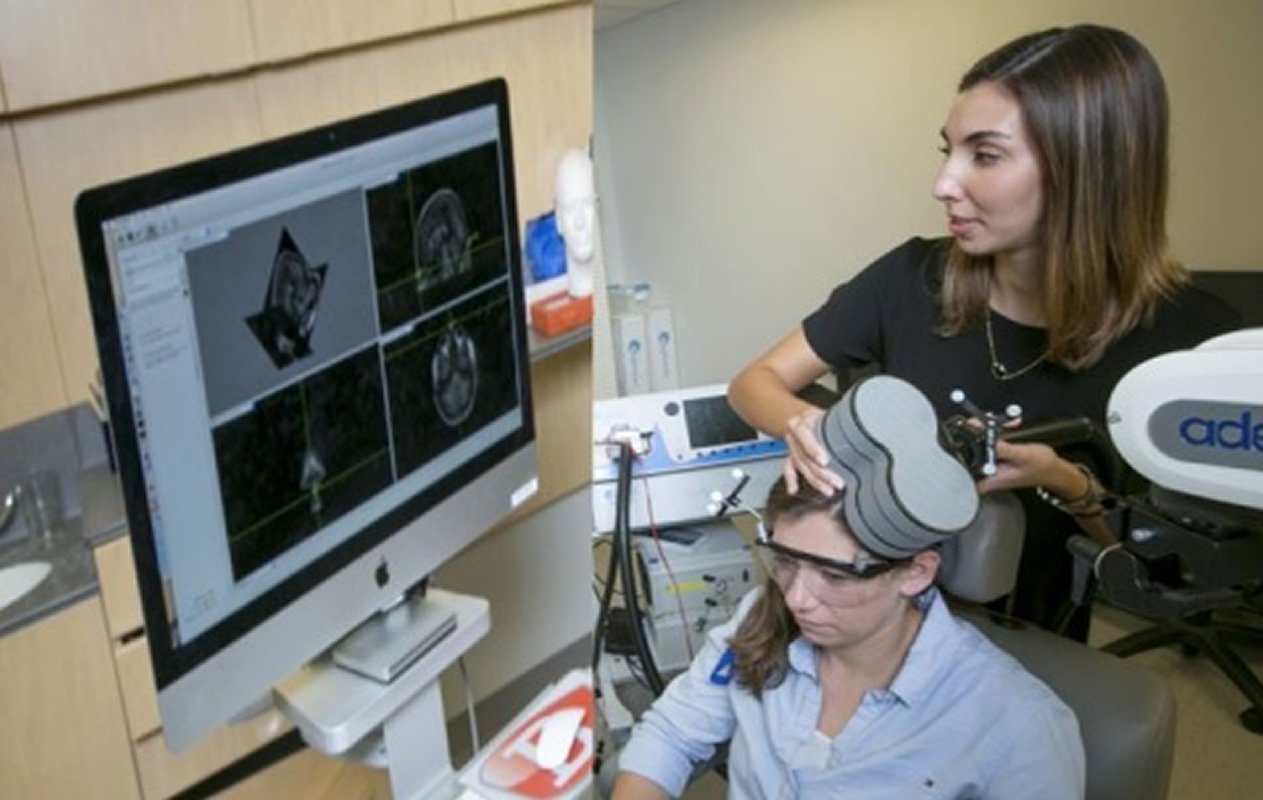Summary: Applying repetitive transcranial magnetic stimulation (rTMS) to the prefrontal cortex helps improve performance in working memory tasks for both young and older subjects. The findings could provide a potential new treatment option for those suffering from Alzheimer’s disease and other memory-related problems.
Source: Duke Department of Neurology
Magnetic stimulation of the brain improves working memory, offering a new potential avenue of therapy for individuals living with Alzheimer’s disease and other forms of dementia, according to new research from the Duke University School of Medicine.
Healthy younger and older adult participants who received a therapy called repetitive transcranial magnetic stimulation (rTMS) performed better on a memory task than during an rTMS-like placebo in the study, which was published here in PLoS One.
“This study relies on highly individualized parameters, from the selection of the stimulated target, based on fMRI activation, to the selection of the difficulty, titrated according to subjects’ performance. Now that we have shown that these specific parameters can improve performance in healthy subjects, we will be able to extend it to populations with memory deficits,” said Lysianne Beynel, PhD, a postdoctoral associate in the Department of Psychiatry and Behavioral Sciences.
Working memory is the process of recalling and then using relevant information while performing a task. It’s a key component of day-to-day tasks like driving to a new location, making a recipe, or following instructions. Individuals with Alzheimer’s disease, which will more than double by 2050, and other forms of dementia, experience progressive loss of working memory and other forms of cognition, leading to a greater risk of injury or death and reducing their ability to function without home care.

Twenty-nine young adults and 18 older adults completed the study, which involved trying to remember and then reproduce a series of letters in alphabetical order. The authors applied either online high-frequency (5Hz) rTMS, or a placebo-like sham over the left prefrontal cortex, an area on the brain responsible for higher executive function. Participants of all ages who received rTMS performed better than those who received the rTMS-like placebo.
“Interestingly, we only saw this effect during when participants were trying their hardest, suggesting a real use-it-or-lose it principle at work here,” said co-author Simon W. Davis, PhD. “Contrary to much of what we hear, aging brains have a remarkable capability to remember past events and to use that information in a flexible manner. The brain stimulation applied in our study shows that older adults benefited just as much as the young.”
Funding: Other authors of the study include Roberto Cabeza, PhD, Courtney Crowell, Susan Hilbig, Wesley Lim, Hannah Palmer, Alexandra Brito, Duy Nguyen, Luber Bruce, and Sarah Lisanby. This research was supported by grant U01 AG050618 from the National Institute on Aging.
Source:
Duke Department of Neurology
Media Contacts:
William Alexander – Duke Department of Neurology
Image Source:
The image is adapted from the Duke news release.
Original Research: Open access
“Online repetitive transcranial magnetic stimulation during working memory in younger and older adults: A randomized within-subject comparison”. L. Beynel, S. W. Davis, C. A. Crowell, S. A. Hilbig, W. Lim, D. Nguyen, H. Palmer, A. Brito, A. V. Peterchev, B. Luber, S. H. Lisanby, R. Cabeza, L. G. Appelbaum.
PLOS ONE. doi:10.1371/journal.pone.0213707
Abstract
Online repetitive transcranial magnetic stimulation during working memory in younger and older adults: A randomized within-subject comparison
Working memory is the ability to perform mental operations on information that is stored in a flexible, limited capacity buffer. The ability to manipulate information in working memory is central to many aspects of human cognition, but also declines with healthy aging. Given the profound importance of such working memory manipulation abilities, there is a concerted effort towards developing approaches to improve them. The current study tested the capacity to enhance working memory manipulation with online repetitive transcranial magnetic stimulation in healthy young and older adults. Online high frequency (5Hz) repetitive transcranial magnetic stimulation was applied over the left dorsolateral prefrontal cortex to test the hypothesis that active repetitive transcranial magnetic stimulation would lead to significant improvements in memory recall accuracy compared to sham stimulation, and that these effects would be most pronounced in working memory manipulation conditions with the highest cognitive demand in both young and older adults. Repetitive transcranial magnetic stimulation was applied while participants were performing a delayed response alphabetization task with three individually-titrated levels of difficulty. The left dorsolateral prefrontal cortex was identified by combining electric field modeling to individualized functional magnetic resonance imaging activation maps and was targeted during the experiment using stereotactic neuronavigation with real-time robotic guidance, allowing optimal coil placement during the stimulation. As no accuracy differences were found between young and older adults, the results from both groups were collapsed. Subsequent analyses revealed that active stimulation significantly increased accuracy relative to sham stimulation, but only for the hardest condition. These results point towards further investigation of repetitive transcranial magnetic stimulation for memory enhancement focusing on high difficulty conditions as those most likely to exhibit benefits.






